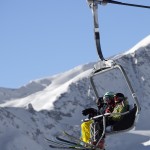At 90, Idaho Rep. Frank Henderson Isn’t Ready To Retire

Emilie Ritter Saunders / StateImpact Idaho
Frank Henderson, a former newsman, says being a reporter gave him the confidence to ask important questions. That, he says, has made all the difference in his political career.
The 2013 Idaho Legislature is in town today for it’s biennial organizational session. This is when lawmakers confirm their leaders and prep for the session which begins next month. Today also happens to be Rep. Frank Henderson’s (R-Post Falls) 90th birthday.
Henderson, born in 1922, was a soldier in World War II and a reporter for a Chicago-area Hearst newspaper. Henderson worked in advertising, publishing, and owned the Post Falls, Idaho newspaper before being elected to mayor and later county commissioner. It wasn’t until 2004, at age 82, Henderson decided to run for the Legislature.
He’s on his 5th term now, and retirement hasn’t yet entered Henderson’s vocabulary. He carries an iPhone and uses an iPad to maintain his schedule. Henderson showed up at our interview with newspaper clippings he’s featured in that talk about economic development. He also brought a copy of his resume which highlights a long career in public administration and industry. Henderson continues to work on economic development projects in the northern part of the state, and has plans for legislation this session focused around boosting the economy.
Q: First of all, happy birthday! Did you ever think you’d be in public office at 90?
A: Uh no, I didn’t think I’d be in public office at 75 either. Politics was never one of the subjects in my list of ambition. My ambition was to be a newsman; I did that, left it, and then did industrial marketing. I purchased a newspaper and I thought I’d retired. Until, one day the person who was retiring as the mayor of Post Falls came to me and said the business community had talked about the next mayor and they wanted me. I thought about it, I ran, and I was elected – that’s how it started.
Q: I’ve been collecting demographics on all of Idaho’s lawmakers, this Legislature is pretty young with nine members in their 30s. Still, Idaho’s Legislature is older than most, does age matter?
A: I don’t think age matters. I think maturity matters. I think in the Legislature it is important to have the diversity. Two of the new legislators from our area represent that diversity. One is a man highly skilled in the assessment and evaluation of properties. The other is a young man who I believe just turned 30, who after several jobs, just received his law degree. He will bring that young, energetic attitude into the Legislature that stirs us older folks into a new area of curiosity and investigation about what really is possible. What really is necessary, in the Legislature. So, diversity of age and experience I believe is essential.
Q: Do you have any plans to retire?
A: I did just run for reelection. I don’t have specific plans on retirement; this could be my last term. That’d be at total of 10 years in the Legislature. It might be time to step aside and let one of those young people with new vitality and different education, different background, to be in the batter’s box so to speak. I might do that. On the other hand, it depends on what is undone at the end of two years. If there is a special opportunity that we haven’t fully implemented by legislation, I might stick around one more time. I’m not ready to make the retirement decision as yet.
Q: What keeps you excited and motivated?
A: It’s a totally satisfying experience. Not only do the individuals in the Legislature work well together, we share a mutual respect, even though we may disagree violently on some things, we still respect the other person. But frankly, the people back home. It is so satisfying to do legislation that answers questions locally. It’s common at the post office or the supermarket or the filling station that people will come up and say ‘Mr. Henderson, we appreciate what you do, thank you’. That’s the reward.
Q: A lot of the challenges in your part of the state have been economic. Last session you sponsored a bill that exempted the sales tax on airplane parts. Why was that important to you?
A: It was important to me because it was important to the state of Idaho and corporations that already exist here. We had 26 companies certified by the FAA to do that work, but they had to charge Idaho sales tax for the hardware. Whereas in our neighboring states, those companies didn’t have to charge a sales tax, so our Idaho companies were at a competitive disadvantage. My goal was to level the playing field so that the competition would be focused on quality and technique.
Q: What are some other things you’re thinking about for economic development and boosting your part of the state this coming session?
A: Diversity is very important. Idaho’s history is focused on mining and timber, and that was too vertical. When metal prices fall or when timber prices fall, our economy is in major trouble because it’s not diverse enough.
We’ve gained it [diversity] especially in medical care. North Idaho has become a regional medical treatment area. One of the things I’ve been working on is funding for our local community colleges so we then can provide the technicians to support the medical industry. We need laboratory technicians, we need x-ray technicians, we need physical therapists, we need respiratory therapists…so I’ve been working on funding for the community colleges to implement more programs that would support the medical industry.
At the same time then, we’re working on expanding programs for people who work with their hands. The welders, the plumbers, the auto mechanics, the diesel mechanics. My goal, is to get industry started in those fields so we have diversification. So when one part of the economy is sick, another part is healthy and we aren’t affected as deeply.
Q: Are there specific issues this session you’d like to work on?
A: The emphasis for the whole Legislature is going to be healthcare. I don’t have any idea how that will end up. I suspect most people do not. We seem to get new interpretations, new evaluations, new edicts from the federal government. And we have to respond by sometime early next year.
What I bring with me that is specific, I have several suggestions that hopefully will be accepted for economic development. It is again to put people to work, to attract industries to come here. My emphasis will be on assisting businesses that are already here. We need to help those existing employers to prosper to a greater degree so they can afford to expand and hire more people.
Q: Can you give me an example?
A: I’d like to reduce the upfront cost of a company that is expanding or relocating. One of the things we do in Idaho that I disagree with is we charge the Idaho sales tax on the building materials used to build a new factory. We have an outstanding example in Post Falls. A company built a new building; it cost some $7 million. They had to pay $189,000 in Idaho sales tax. That’s an upfront cost. Now, the building is complete, the company paid that, and at this point they have already hired 72 new employees.
So you see the state is profiting and getting revenue from those 72 employees. Those are new salaries. If they average $40,000 times 70, that’s $280,000 a year into our local economy. I can’t’ see any justification to charge the sales tax on the building materials when we create jobs. One of my bills will be a suggestion on how to handle that problem, and other upfront costs.

